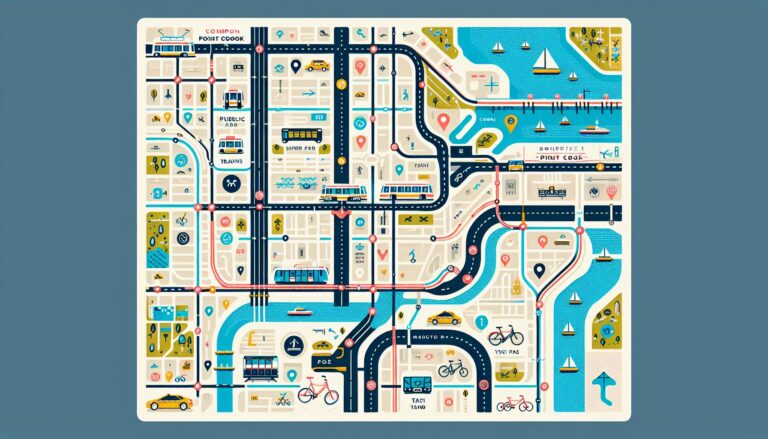Optimising Your Ride: Average Commute Times from Point Cook to Melbourne CBD
Understanding the Commute
When I first contemplated the move to Point Cook, I wondered about the daily commute to Melbourne CBD. It’s a common concern for many of us who relish the idea of suburban living but work in the city. I’ve since discovered that understanding the nuances of this journey is key to making it as smooth as possible.
Firstly, let’s talk about average commute times. Depending on the mode of transportation and the time of day, the travel duration can vary significantly. I’ve broken down the main options:
| Mode of Transport | Average Commute Time |
|---|---|
| Car | 40-60 minutes |
| Bus | 50-70 minutes |
| Train | 30-45 minutes |
Driving often seems like the quickest option, especially outside peak hours. However, during rush hour, traffic can add a hefty delay. Public transport, while slightly longer, removes the stress of navigating through congestion and can offer a more consistent travel time.
Understanding peak travel times is crucial. Morning peak hours tend to be from 7:30 AM to 9:00 AM, and evening peak hours from 5:00 PM to 6:30 PM. Travelling outside these times can significantly reduce your commute duration. Also, flexibility in work hours or telecommuting options can be a game-changer in managing your daily travel.
Knowing the quickest routes is equally important. By car, the Princes Freeway is a direct path, but exploring alternative routes like Palmers Road or taking the Western Ring Road can sometimes save time. Public transport users should be familiar with the Werribee line, particularly the express services, which omit certain stops and thus, shave off precious minutes.
Lastly, my personal tips for a smoother commute come down to preparation and mindset. I always check traffic updates and train schedules before leaving. A good podcast or playlist can turn travel time into ‘me’ time. For those using public transport, an up-to-date travel card and a good book or e-reader can make the journey more enjoyable.
Exploring Different Modes of Transport
As I embark on this exploration of the various modes of transport from Point Cook to Melbourne CBD, it’s crucial to dig into the specifics. Different options can vastly alter your experience and commute time, affecting your daily routine and overall satisfaction with your journey.
Driving is often the first option that comes to mind. It offers the flexibility of leaving at your own time and the comfort of personal space. However, traffic can be a significant variable, especially during peak hours. I’ve found that the mornings and evenings can be particularly congested, turning what should be a 30-minute drive into a challenging ordeal that tests patience.
Public Transport, specifically buses and trains, presents an alternative that many opt for. The Route 495 bus, for instance, connects Point Cook to Williams Landing Station, from where you can catch a train to the CBD. The coordination between bus and train schedules is something to pay attention to, ensuring you don’t end up waiting too long for your connection.
Using Trains solely involves reaching the nearest station by car or bus and then taking a direct route into the city. From my experience, the Werribee line is the most convenient for those starting from Point Cook. During peak times, aiming for the express services can shave valuable minutes off your journey.
Adding a Bike Ride into the mix could be an intriguing option for the more active commuters. Incorporating a bit of exercise, by biking to the station or all the way into the city, not only benefits your health but can also be incredibly refreshing and a great start to the day.
Average Commute Time by Car
Embarking on a commute from Point Cook to Melbourne CBD by car has its own set of nuances that subtly influence the journey’s duration. Straight off, it’s vital to grasp that traffic congestion plays a massive role. Driving during peak hours, specifically 7-9 AM and 5-7 PM, can significantly extend your commute time.
On a good day, without the snarl-ups, the drive can be quite breezy, averaging about 40 minutes. However, add in the regular morning or evening traffic, and you’re looking at an entirely different scenario. Below is a quick overview of expected commute times by car:
| Time of Day | Average Commute Time |
|---|---|
| Off-Peak | 40 minutes |
| Peak Morning | 1 hour 20 minutes |
| Peak Evening | 1 hour 15 minutes |
These figures highlight the variance in commute times, dependent on when one decides to hit the road. It’s clear that travelling outside of peak hours can save you a significant chunk of time.
On that note, I’ve found a few strategies that might ease the commuting burden for those tethered to their vehicles. Alternate routes can be a godsend, especially if you’re familiar with the backstreets of Point Cook and Melbourne CBD. Tools like Google Maps or Waze not only suggest the fastest routes but also provide real-time traffic updates, helping you dodge congested spots.
Another aspect worth considering is the cost of parking. Melbourne CBD is notorious for its steep parking fees, an important factor that adds to the overall commute expense. Early bird specials can lessen the blow, but they often require arriving before a certain time, which might not align with everyone’s schedules.
Incorporating a car commute from Point Cook to Melbourne CBD into one’s daily routine demands a balance between managing time efficiently and navigating the unpredictability of road conditions. While there are definite challenges, planning and the utilisation of available technology can make the journey more bearable.
As we dive deeper into exploring various commuting options, it’s essential to weigh the pros and cons of each mode of transport. Driving offers the convenience of personal space and direct routes but comes with its own set of hurdles such as traffic delays and parking costs.
Average Commute Time by Public Transport
After discussing the challenges and durations associated with commuting by car from Point Cook to Melbourne CBD, it’s only fair to dive into what the journey looks like for those who opt for public transport. My objective here is to shed light on a different aspect of the commute, providing you with comprehensive insights.
The backbone of public transport from Point Cook to the heart of Melbourne is primarily served by buses and train services. Unlike the car commute, the time taken can be more predictable, barring any unexpected delays like signal failures or severe weather conditions. First, let’s look at the numbers that paint a clear picture of what you’re in for if you choose public transport.
| Time of Day | Average Commute Time |
|---|---|
| Off-peak | 50-60 minutes |
| Peak Morning | 60-75 minutes |
| Peak Evening | 60-75 minutes |
Peak hours often see an increase in travel time due to higher passenger volumes, which can sometimes lead to longer waits at stations or bus stops. Despite this, many find the predictability and the ability to use travel time productively – say, catching up on emails or reading – a significant upside.
The journey usually involves catching a bus from Point Cook to the nearest train station, which in most cases is Williams Landing. From there, commuters hop on a train that goes directly to the CBD. This switch from bus to train adds a bit of transition time but also offers a moment to stretch your legs.
Additionally, the scope for real-time tracking of buses and trains through various apps has considerably eased the stress of uncertain wait times. Knowing exactly when your next ride is due means you can manage your schedule more effectively, squeezing in a coffee if there’s time.
Another aspect that’s impossible to overlook is the cost. Public transport, even with its occasional inconveniences, is undeniably more economical compared to the expenses of driving – fuel, maintenance, and the ever-rising cost of parking in the CBD. Plus, there’s something to be said about the environmental benefits of reducing our carbon footprint by opting for shared modes of transportation.
Safety and convenience also play pivotal roles in the decision to take public transport. The stations and buses are well-lit, regularly patrolled, and equipped with safety measures that provide peace of mind during early morning or late-night commutes.
Making Your Commute Smoother
Embarking on a daily commute from Point Cook to Melbourne CBD involves more than just hopping on the nearest bus or train. I’ve found that a little preparation goes a long way in making this journey smoother and more predictable. Here are a few tips I’ve picked up along the way.
Planning Ahead is imperative. Before you even set foot outside, check the PTV (Public Transport Victoria) app or website for live updates. I’ve saved myself from countless delays by simply checking the status of my usual train or bus. Real-time tracking apps are a godsend in this regard. They not only show you if your ride is on time but can also suggest alternative routes if there’s an unexpected delay.
Investing in a good Myki card is something I can’t stress enough. Keep it topped up to avoid those last-minute scrambles. I also recommend setting up auto top-up; it’s one less thing to worry about. Plus, carrying a backup Myki in your bag isn’t a bad idea either—just in case.
Choosing the Right Time to travel significantly affects your commute. While it’s not always possible to avoid peak hours, I’ve found that even leaving 15 minutes earlier or later can make a difference. Trains and buses are considerably less crowded, making for a more comfortable journey. Here are the average commute times I’ve noted:
| Time of Day | Average Commute Time (mins) |
|---|---|
| Off-Peak | 45 – 55 |
| Peak Morning | 50 – 65 |
| Peak Evening | 50 – 70 |
Comfort and Entertainment should not be overlooked. A good book, podcast, or playlist can transform your commute from a chore into a pleasant interlude. I always carry a pair of noise-cancelling headphones and a charged power bank. It’s amazing how much a bit of music or an interesting podcast can boost your mood.
Lastly, don’t forget to dress appropriately for your commute. Layering is key, especially in Melbourne’s unpredictable weather. An umbrella or raincoat should be a staple in your bag. Comfortable shoes are a must too; you never know when you might need to walk a bit further or stand for your entire journey.
Conclusion
Navigating the journey from Point Cook to Melbourne CBD doesn’t have to be a daily challenge. Armed with the right tools and a bit of foresight, I’ve found that it’s entirely possible to make this commute not just bearable but quite enjoyable. Remembering to check the PTV app and keeping my Myki card topped up has saved me countless times. And let’s not forget the little comforts that make a big difference—like my trusty noise-cancelling headphones and a cosy jacket for those unpredictable Melbourne mornings. Sure, there might be days when the weather throws a curveball or the trains are a tad more crowded than usual. But with a good pair of shoes and a positive mindset, I’m ready to tackle whatever comes my way. Here’s to smoother commuting and making the most of our journeys!




